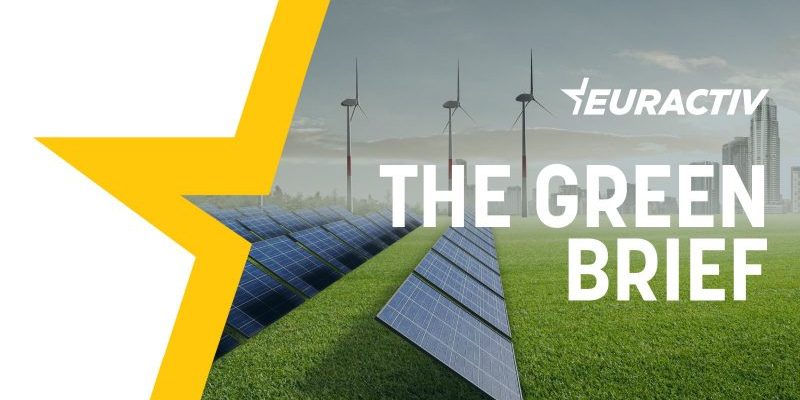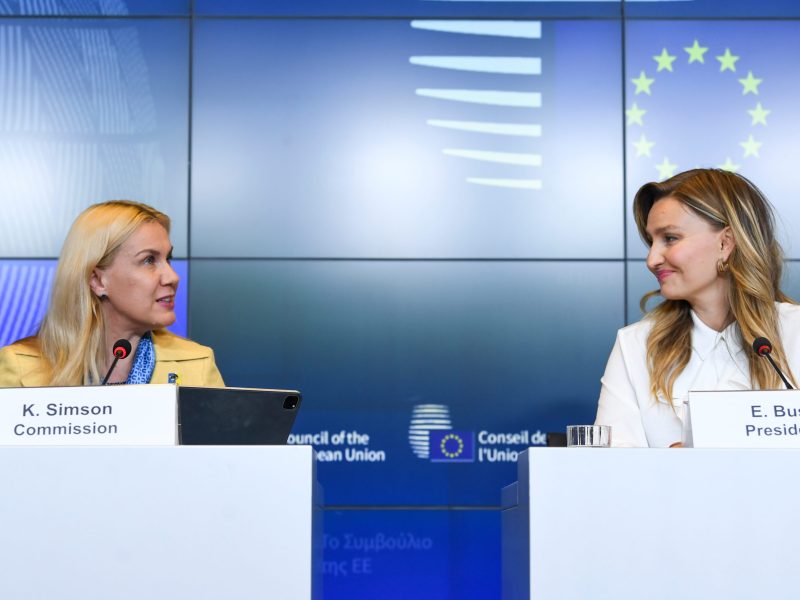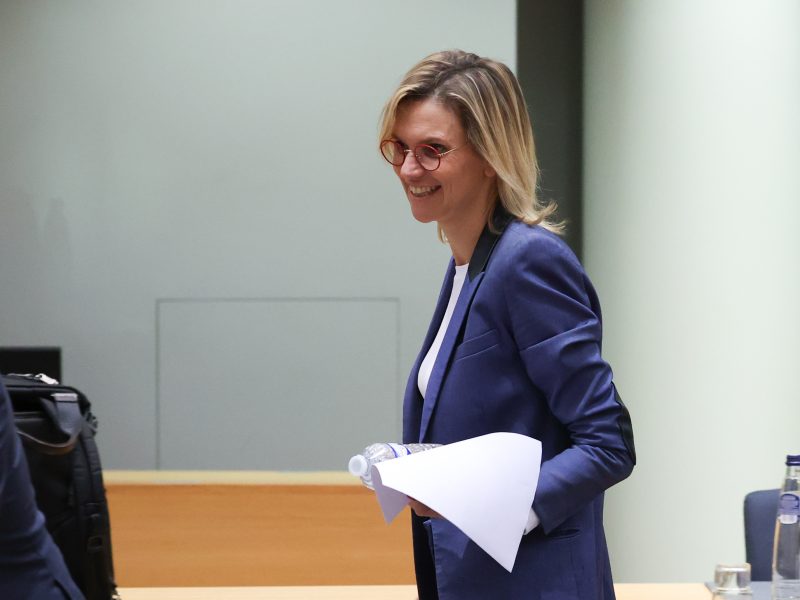Welcome to EURACTIV’s Green Brief, our weekly selection of energy and environment news from across Europe. To subscribe, follow this link. You can also subscribe to our daily newsletter here and to our comprehensive weekly update here.
Poland’s climate minister, Anna Moskwa, caused shockwaves in Brussels last week when she announced that Poland would file a lawsuit against a recently-adopted EU regulation requiring all new cars in Europe to be zero-emission as of 2035.
“We don’t agree with this and other documents from the ‘Fit for 55’ package and we’re bringing this to the European Court of Justice. I hope other countries will join,” Moskwa told a radio station on 12 June.
Poland has consistently opposed the EU’s package of climate legislation, dubbed ‘Fit for 55’ because it aims to cut the bloc’s carbon emissions 55% below 1990 levels before the end of the decade.
Warsaw was the only EU country to vote against the new car emission rules, arguing they lacked a full analysis of the social and economic consequences of the proposed ban.
According to Moskwa, decisions on the entire ‘Fit for 55’ climate package should have been taken on the basis of unanimity – not qualified majority – since it affects the energy mix of EU member states, which is a national competence and a matter of sovereignty.
“We will demand a change in the legal basis, that is, a de facto decision of the EU court of justice, that all the decisions were taken erroneously, on the basis of an erroneous formal legal basis, and thus are invalid documents,” the minister declared.
In Warsaw’s firing line is the EU’s Emissions Trading Scheme, which extended carbon pricing to transport and heating fuels – a move MEPs warned risks hiking energy bills, leading to social unrest. The new law, agreed in December, will be accompanied by a new social climate fund to cushion the impact on the poorest households, and safeguards to prevent the carbon price from rising above a certain limit.
But this is insufficient for Warsaw, which objects to “the excessive burdens on society that result from the EU’s requirements for climate and environmental targets”, according to a spokesperson for the Polish climate ministry.
“The final analysis of the individual documents that will be the subject of the complaint is currently underway and, depending on the outcome, charges will be formulated,” the spokesperson added.
Brussels not worried
As of now, the Court of Justice of the European Union has not yet received a formal complaint from Warsaw, even though Moskwa said she would file the lawsuit “within days”.
But EU officials in Brussels are not too worried. “We are confident in the legal basis of the proposals we made and the final decisions adopted by the co-legislators,” a European Commission official told EURACTIV.
The EU’s assurance is probably related to the legal precedent that was set just a few years ago. In 2016, Poland already filed a complaint with the EU Court of Justice against the Market Stability Reserve, which regulates the amount of CO2 allowances on the EU carbon market.
The argument at the time was similar: according to Warsaw, the decision should have been taken by unanimity because it significantly affected Poland’s choice of energy sources, which is a matter of national sovereignty.
The court rejected Poland’s argument as unfounded, saying Article 191 of the EU treaty gives the EU a role in the preservation of the environment and the fight against climate change, “in particular by establishing and executing international agreements to that end”.
A special unanimity procedure was therefore not required, the court ruled, rejecting Poland’s request.
Why, then, would Poland launch another court case against Brussels along the same line if it has so little chance of success?
For observers in Brussels and Warsaw, the answer lies in the elections that will be held in late 2023 to designate members of the Sjem and the Senate, the two chambers of the Polish Parliament.
The nationalist Law and Justice (PiS) party currently in government has lately been polling at 34.3%, closely followed at 30.7% by a coalition of opposition parties bringing together the centre-right, the liberals and the Greens.
“Our reading is that this is dominated by national politics, to build up a campaign narrative for the upcoming Polish elections later this year,” says Klaus Röhrig from Climate Action Network (CAN) Europe, a green campaign group.
For Röhrig, Warsaw’s challenge against EU climate legislation fits a pattern where the nationalist PiS party presents itself domestically as the defender of the interests of Polish businesses and citizens against meddling from Brussels.
Joana Maćkowiak Pandera, President of Forum Energii, a Polish think-tank, shares the same view. “It’s political motivation with no substantive justification, related to the elections and the strong voice of the radical right, which breaks through most strongly politically,” she told EURACTIV.
With a court challenge against the EU, PiS is likely sounding the electorate to see whether its anti-EU and anti-climate rhetoric resonates with the public in opinion polls.
For the government in Warsaw, it’s a comfortable political posture to be in, Röhrig points out.
“For the PiS party, the strategy is to portray themselves as the victims of Brussels, regardless of whether they win or lose the court case. This is why it is so important to call their bluff.”
Nevertheless, it is a bluff that could score political points back home and help secure another term in government for the ruling PiS party.
– Frédéric Simon and Karolina Zbytniewska
BELGRADE | BUDAPEST. Serbia establishes joint gas company with Hungary. At the Strategic Council for Cooperation between Serbia and Hungary in Palić, an agreement was signed on the establishment of a joint venture for gas SERBHUNGAS d.o.o. between Srbijagas and the Hungarian electricity company. Read more.
ROME. Italy’s Salvini sees ‘China-gate’ in electric cars push. Italian Deputy Prime Minister and far-right Lega leader Matteo Salvini suspect illicit complicity between the EU, Germany and China in favour of electromobility and against the Italian car industry. Read more.
THE HAGUE. Netherlands, Namibia to intensify cooperation on green hydrogen. Increased cooperation in the field of green hydrogen as well as dialogue with third countries concerning the war in Ukraine, were the main topics during Prime Minister Rutte’s (VVD/Renew) visit to Namibia on Monday. Read more.
SOFIA. Bulgaria edges closer to building US nuclear reactor. Bulgaria is getting closer to making a US nuclear reactor after the Bulgarian nuclear power plant Kozloduy signed an official engineering contract for Front-End Engineering and Design of a nuclear reactor using the AP-1000 technology with Westinghouse on Wednesday. Read more.
BRATISLAVA. Slovakia’s gap in heat pump subsidies could ‘lose a year’ of progress. Households in Slovakia postpone replacing their old fossil fuel boilers with greener heat pumps due to a six-month subsidy lag during a crucial period before the heating season, said Petra Čakovská of the Slovak consumer group SOS. Read more.
BERLIN. Germany steps up state aid to support steel industry. The government will help steel giant ThyssenKrupp with its green transition and is confident that the EU Commission will play along, Economy Minister Robert Habeck told steelworkers at a union rally in Duisburg on Wednesday. Read more.
HELSINKI. Finland heading towards full electric transport. Finland is rapidly moving towards full electrification of transportation as attitudes towards electric vehicles that remain expensive become more favourable, and petrol prices help drive the change. Read more.
BERLIN. German government resolves paralysis over heating policy. A controversial law banning fossil-fuel heating will enter the German parliament this week, the party leaders of Germany’s three-way coalition announced on Tuesday, resolving a months-long feud and blockade of government business. Read more.
EU rules on renewable hydrogen officially written into law. The two Delegated Acts describing what counts as “renewable” hydrogen have officially been published in the Official Journal of the European Union on Tuesday (20 June).
The EU formally adopted proposed rules on renewable hydrogen production on 14 June after the expiry of a four-month consultation period during which the European Parliament and EU member states had the opportunity to reject them.
The announcement was made by Kadri Simson, the EU’s energy commissioner, who said the two Delegated Acts had now been formally adopted. “This means legal certainty for both producers and consumers of renewable hydrogen and is a pivotal step to attract necessary investments to decarbonise our energy system,” she wrote on Twitter.
The two Delegated Acts define rules for what counts as “renewable” hydrogen, along three main criteria: 1) additionality, 2) temporal correlation, and 3) geographical correlation. They are accessible here and here in the Official Journal of the EU. More detail here and here on the European Commission website. Further coverage here from Hydrogen Insight. (Frédéric Simon | EURACTIV.com).
////
How prepared is Europe for extreme weather? Europe can expect longer, more intense and more dangerous heatwaves for the summers to come, as well as an increased risk of wildfires and droughts, according to the European Environment Agency. Changes in rainfall patterns due to climate change could also lead to more extreme and frequent flooding, posing a risk to agricultural yields, the EEA said in a new data set published on 14 June.
“The European Environment Agency’s new tool comes just in time for the heatwave summer and shows that we have major gaps not only in climate protection, but also in climate adaptation,” said Jutta Paulus MEP, climate expert for the Greens/EFA group in the European Parliament.
The EU’s emergency response may be effective for now, but to tackle the effects of climate change in the long-term, national and local adaptation policies need to be strengthened, Paulus argued, saying “an ambitious Nature Restoration Law” is needed for that. See the full report here from the EEA. (Annita Elissaiou | EURACTIV.com).
////
No retroactive waste responsibility for solar PV manufacturers. The Council has agreed its negotiating mandate for the amended waste electronic and electronic equipment (WEEE) directive, which regulates waste from products such as computers, fridges and photovoltaic panels.
The mandate brings the directive in line with a January 2022 ruling by the Court of Justice of the European Union, which had declared parts of the directive invalid because of unjustified retroactive application of extended producer responsibility rules to waste from photovoltaic panels placed on the market between 13 August 2005 and 13 August 2012.
The European Commission adopted its proposal for a targeted amendment to the WEEE directive in February. The Council’s mandate endorses those proposals, and further clarifies connections with the provisions of the Waste Framework Directive. More detail here. (Annita Elissaiou | EURACTIV.com)
////
EU makes progress on Critical Minerals Agreement with the US. The European Commission on 14 June adopted its negotiating directives for the Critical Minerals Agreement with the United States, bringing it one step closer to creating transatlantic supply chains in critical raw materials for the production of batteries for electric vehicles.
When concluded, the deal will give the EU the status of a Free Trade Agreement partner with the US, letting European companies compete on equal footing with their American counterparts on the US market. The deal will also reinforce the Net-Zero Industry Act and Critical Raw Materials Act, boosting the manufacturing of carbon-neutral technologies, the European Commission said in a statement.
“Negotiating a Critical Minerals Agreement with the US is key to ensuring that the EU, as an US ally receives an FTA-like treatment under the IRA,” said Valdis Dombrovskis, the Commission’s executive vice-president in charge of trade. “It will ensure that the EU mining and chemical companies have fair and frictionless access to the US market and are able to supply both EU and US electric vehicle producers.” More detail here. (Annita Elissaiou | EURACTIV.com)
////
Biodiversity offsets excluded from EU green taxonomy update. The European Commission put forward proposals on 13 June to widen the scope of the EU’s sustainable finance taxonomy to four new areas – water, circular economy, pollution prevention, and biodiversity.
Campaigners hailed the move, praising the Commission in particular for abandoning the idea of including biodiversity offsets. “WWF is pleased with the Commission’s decision to exclude biodiversity offsetting from the Taxonomy criteria for biodiversity conservation and restoration activities,” said Sebastien Godinot from the WWF’s European Policy Office.
Campaigners had earlier warned about the Commission’s intention to include offsetting schemes in the economic activities related to biodiversity protection and nature restoration. Read the Commission’s proposal here and the WWF’s reaction here. (Frédéric Simon | EURACTIV.com).
JUNE
- 20-22 JUNE. EU Sustainable Energy Week
- 27 JUNE. ENVI committee vote on EU Nature Restoration Law (Round 2)
- 28 JUNE. Commission communication on climate change, environmental degradation, and security and defence
- 29-30 JUNE. European Council.
- 30 JUNE. Deadline for European Member States to update their revised National Energy and Climate Plans (NECPs).
JULY
- 5 JULY. Commission to present Food and biodiversity package (Soil law, Regulation on plants produced by new genomic techniques, Revision of food waste and textiles aspects of the EU waste framework Directive, Revision of legislation on seeds and other plant and forest reproductive material)
- 10 JULY. Plenary vote on EU Nature Restoration Law and Ambient air quality and cleaner air for Europe
- 11 JULY. Commission to present Greening transport package.
- 19 JULY. ITRE committee vote on electricity market design
SECOND SEMESTER
- 7 SEPTEMBER. ITRE committee vote on protection against market manipulation in the wholesale energy market
- 7 SEPTEMBER. ITRE committee vote on Critical Raw Materials Act
- 20 SEPTEMBER. ENVI committee vote on Packaging and Packaging Waste Regulation
- 2 OCTOBER. Parliament plenary vote on Packaging and Packaging Waste Regulation
- 12 OCTOBER. ITRE committee vote on Net Zero Industry Act
- 26-27 OCTOBER. European Council.
- 30 NOVEMBER-12 DECEMBER. UN Climate Change Conference (COP 28), Dubai.
- 14-15 DECEMBER. European Council.
- Q4. Revision of REACH regulation.
[Edited by Nathalie Weatherald and Frédéric Simon]




